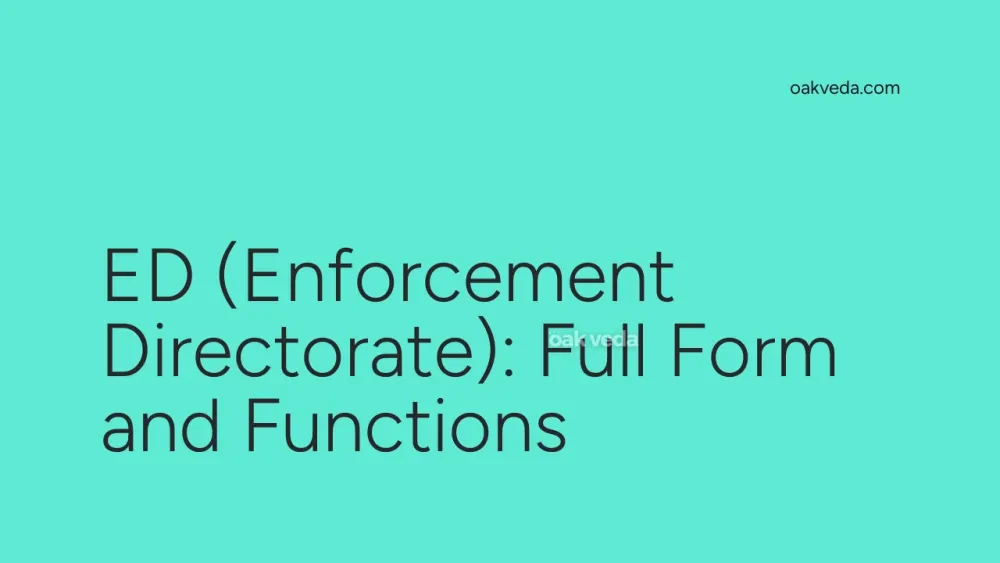
What is the Full Form of ED?
The full form of ED is Enforcement Directorate. This organization plays a crucial role in India's financial landscape, serving as a watchdog against economic offenses and financial crimes.
What is Enforcement Directorate?
The Enforcement Directorate is a specialized financial investigation agency under the Department of Revenue, Ministry of Finance, Government of India. Established in 1956, the ED is responsible for enforcing economic laws and combating financial crimes that threaten the nation's economic stability.
Origin and Development of Enforcement Directorate
The Enforcement Directorate was founded in 1956 to address the growing concerns of foreign exchange violations and economic offenses. Over the years, it has evolved into a powerful agency with a broader mandate to tackle complex financial crimes.
Key Milestones:
- 1956: Establishment of the Enforcement Directorate
- 1999: Implementation of the Foreign Exchange Management Act (FEMA)
- 2002: Introduction of the Prevention of Money Laundering Act (PMLA)
How does Enforcement Directorate work?
The ED operates through a network of offices across India, with its headquarters in New Delhi. It has regional offices in major cities like Mumbai, Kolkata, Chennai, and Chandigarh, as well as sub-zonal offices in various other locations.
The agency's workforce comprises officers from various elite services, including:
- Indian Revenue Service (IRS)
- Indian Police Service (IPS)
- Indian Corporate Law Service (ICLS)
- Indian Administrative Service (IAS)
This diverse team brings a wide range of expertise to tackle complex financial crimes effectively.
Functions of Enforcement Directorate
The Enforcement Directorate's primary functions revolve around two major laws:
-
Foreign Exchange Management Act (FEMA), 1999: The ED enforces regulations related to foreign exchange transactions and prevents violations that could harm India's economic interests.
-
Prevention of Money Laundering Act (PMLA), 2002: This act empowers the ED to investigate and prosecute cases of money laundering, which often involve complex financial transactions designed to conceal the origins of illegally obtained money.
Key Operational Areas:
- Gathering and analyzing intelligence on potential FEMA violations
- Investigating suspected infringements of FEMA regulations
- Adjudicating cases related to FEMA and the former Foreign Exchange Regulation Act (FERA)
- Conducting searches, seizures, and arrests in connection with PMLA cases
- Collaborating with other law enforcement agencies to combat financial crimes
Applications of Enforcement Directorate
The ED's work has far-reaching implications for India's economic security and integrity. Some key applications include:
-
Curbing Hawala Transactions: The ED plays a crucial role in identifying and stopping illegal foreign exchange racketeering, commonly known as hawala.
-
Ensuring Export Proceeds Realization: The agency monitors and investigates cases where export proceeds are not realized, protecting India's foreign exchange reserves.
-
Combating Money Laundering: By investigating complex money laundering schemes, the ED helps prevent the integration of illicit funds into the legitimate economy.
-
Recovering Proceeds of Crime: Through its investigations and legal actions, the ED works to recover assets and funds obtained through criminal activities.
Features of Enforcement Directorate
The Enforcement Directorate possesses several unique features that enable it to carry out its mandate effectively:
-
Specialized Expertise: The agency's multi-disciplinary team brings together diverse skills in finance, law enforcement, and administration.
-
Investigative Powers: The ED has broad powers to conduct searches, seize assets, and make arrests in connection with financial crimes.
-
International Cooperation: The agency collaborates with international bodies and foreign law enforcement agencies to tackle cross-border financial crimes.
-
Technological Capabilities: The ED employs advanced financial forensics and data analysis tools to uncover complex financial frauds.
Benefits of Enforcement Directorate
The existence and operations of the Enforcement Directorate offer several benefits to India's economic ecosystem:
-
Deterrence of Financial Crimes: The ED's active investigations and prosecutions serve as a deterrent to potential offenders.
-
Protection of Economic Interests: By enforcing FEMA and PMLA, the ED helps safeguard India's economic interests and financial stability.
-
Recovery of Illicit Funds: The agency's efforts lead to the recovery of substantial amounts of money obtained through illegal means.
-
Enhancing Financial System Integrity: The ED's work contributes to maintaining the integrity and credibility of India's financial system.
Limitations or Challenges of Enforcement Directorate
Despite its crucial role, the Enforcement Directorate faces several challenges:
-
Complex Nature of Financial Crimes: Modern financial crimes often involve sophisticated techniques and technologies, making investigations challenging.
-
Resource Constraints: The agency sometimes struggles with limited manpower and resources compared to the scale of financial crimes it needs to investigate.
-
Legal Hurdles: Complex legal procedures and prolonged court battles can sometimes hinder the swift prosecution of offenders.
-
Political Sensitivities: High-profile cases involving politically connected individuals can sometimes lead to controversies and allegations of bias.
Future Developments in Enforcement Directorate Technology
To stay ahead of evolving financial crimes, the ED is likely to focus on:
-
Advanced Data Analytics: Implementing AI and machine learning for better detection of suspicious financial patterns.
-
Blockchain Forensics: Developing capabilities to track and trace cryptocurrency transactions involved in financial crimes.
-
Enhanced International Cooperation: Strengthening ties with global financial intelligence units for better information sharing and coordinated actions.
FAQs on ED Full Form
-
What is the primary role of the Enforcement Directorate? The ED's primary role is to enforce FEMA and PMLA, investigating and prosecuting cases of foreign exchange violations and money laundering.
-
When was the Enforcement Directorate established? The Enforcement Directorate was established in 1956.
-
Who heads the Enforcement Directorate? The ED is headed by a Director, appointed by the central government.
-
Can the Enforcement Directorate arrest individuals? Yes, the ED has the power to arrest individuals under the provisions of the PMLA.
-
How does one report a financial crime to the ED? Complaints can be filed through the ED's official website or at their regional offices. However, the ED typically acts on intelligence from various government agencies rather than public complaints.
You may be interested in:

